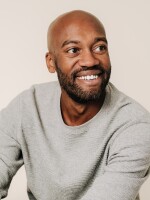About 60 million adults do their banking at places other than banks, according to a new survey by the Federal Deposit Insurance Corp. The FDIC wants consumers to rely more on insured banks, but a lot of people feel it's in their financial interest to stay away from traditional banks.
Al Walker is one of the people the FDIC is hoping to convince. In his fitted jeans, hipster scarf and oversized sunglasses, he may seem a little too trendy for ACE Cash Express, a check-cashing store in Washington, D.C.'s U Street district.
But he's outside the national check casher — even though he has a bank account.
One Of Millions
Walker is one of millions of people who rely heavily on check-cashing services, payday loans or pawn shops instead of traditional, insured banks. Despite FDIC warnings, he likes ACE's services.
"I don't have to worry about them posting anything to my account," Walker said. "I don't have to worry about them taking anything from my account. I don't have to worry about an overdraft fee here. I don't have to worry about overdraft protection. I don't have to worry about whether this is free. I know what I'm paying; it's the same every time I come here — and maybe that's something banks should look into."
Walker graduated from American University in 2006. He was laid off from a doctor's office four months ago and goes to ACE to cash unemployment checks.
I have an extreme distrust and, I guess, disdain for banks, because so many of them have done me and my money wrong.
The FDIC survey found that 17 million adults in the U.S. don't have bank accounts at all. Another 43 million have bank accounts, but still rely on places like ACE Cash Express.
Minorities and people who are poor, unmarried or without a college education are more likely to not use banks. And more than half of black households use financial services outside of traditional banks or credit unions.
Inside ACE, the line snakes to the door. Walker comes here so often, the teller, Roberta, knows him by name.
While getting him his cash, she explains some of the fees: "2.5 percent for payroll and government checks; 4 percent for tax checks; 5 percent for insurance checks and other checks."
Walker gives up a bit less than $5 each time he gets an unemployment check. If he used a traditional checking account, there'd be no fee at all.
Rational Economic Decisions
FDIC Chairwoman Sheila Bair told reporters last week that people use services outside of banks because they make sense for them.
"A lot of this is the product of rational economic decision making," she said. "And a lot of the folks who do not use banks now, had one choose them and did not find it to be cost-effective for them."
In the FDIC survey, the biggest reason people gave for not using banks was that they didn't have enough money to maintain their accounts. And many outside of the ACE check-cashing store had nothing nice to say about the banks they avoid. They complained about widespread overdraft fees, waiting for checks to post and transactions hitting their accounts too early or too late. For them, places like ACE took out that hassle and expense.
Walker says he just doesn't like banks — at all.
"I have an extreme distrust and, I guess, disdain for banks, because so many of them have done me and my money wrong," he said.
Still, the FDIC is pushing banks to introduce new types of services for low-income individuals. They want lower transaction and penalty fees for poorer bank customers, as well as easier access to credit.
Banks so far have not shown much interest in reaching these customers, however. In the survey, fewer than 20 percent of banks said reaching out to these communities is one of their priorities.
Copyright 2022 NPR. To see more, visit https://www.npr.org. 9(MDAzMjM2NDYzMDEyMzc1Njk5NjAxNzY3OQ001))







